

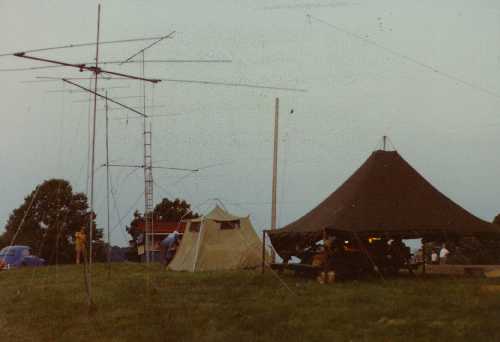

|
Field Day! If you are a radio ham, or if there is one in your family, you know it well. Occuring on the last weekend in June, Field Day is a contest sponsored by the ARRL (American Radio Relay League) ostensibly to test preparadness of the radio hams and their clubs, but also giving them a chance to "strut their stuff" within the ham fraternity and to the community at large, and to have a weekend of shared experience with buddies of like interest.
The idea is to go out into a field somewhere, away from one's usual operating environment, and to operate under emergency power. And out in that field, under sometimes trying conditions, try to contact as many other groups or individuals operating under similar circumstances as possible. A point for each contact. Multipliers for the degree of emergency power and circumstance. Extra points for sending certain specified emergency messages. 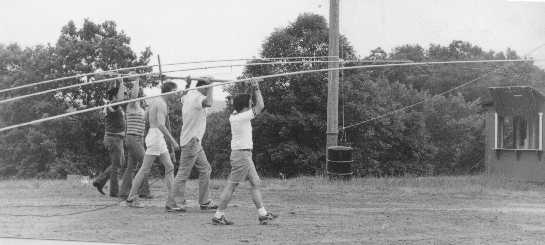 The club members arrive at the site early on Saturday morning. There are tents to be erected, antennas to be unpacked, assembled and raised, the power source (generator or batteries) set up, equipment brought into the tents and tested. All this work is scheduled and organized months beforehand. This is the big contest of the year, in fact, for some clubs, the only contest. For many years, the Field Day site for the South Hills Brass Pounders and Modulators was a hill top in South Park, across from the model airplane field. The club - of Whitehall PA but drawing its members from all over the South Hills - owned a big surplus army tent, a number of towers and beams which were packed during most of the year in long, thin crates dubbed "anaconda coffins" and, the pride and desperation of the club, a huge, trailer housed gas powered generator. Many years ago, two telephone poles had been erected at the site, spaced exactly right for an 80 meter dipole; two others were spaced for 40 meters. South Park also provided several small sheds which were used for the contest. Members provided additional tents. When it was all set up, it resembled an army installation, with the generator in the center, and the cook tent also very prominent. 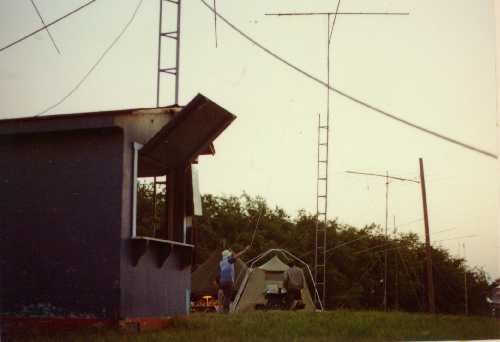 The members provided the transmitters and receivers, mikes and keys, and tables to put them on and chairs for the operators. Desk lamps for night time operation. Each band had its own tent or shack, and operator/logger teams assigned to each time slot. All very serious business! The contest runs for a 24 hour period, from 2 pm on Saturday to 5 pm on Sunday . This gives a little leeway to the club that may have problems in setting up; they start later but can operate until later on Sunday. |
|
And the contest begins. Teams are ready. The generator is chugging away, the transmitters warmed. On all the bands the message goes out: "CQ FD CQ FD DE W3PIQ" And as the responses are received, they are logged in. |
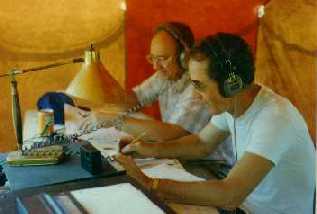
|
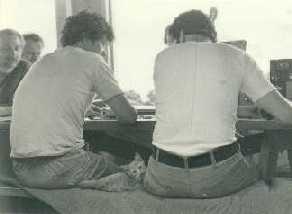
|
And so it goes, through the afternoon and into the night. Supper - hot dogs and beans - is ready for those operators feeling pangs of hunger, and remains hot and ready through the night. The day crew leaves for a couple hours of shut eye at home, the night crew arrives. The contest churns on, the points pile up. |
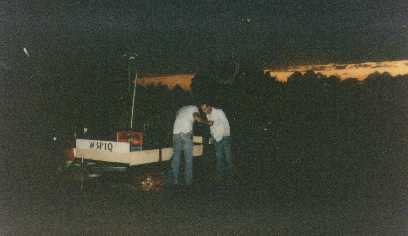 And then, in the middle of the night, the generator shuts down! Not only do these hams need to know how to trouble shoot electronics, they have to be experts in reviving the old, cranky, gasoline powered generator. The best of the night crew tackle the job. Soon the generator is running again and only 15 minutes have been lost. |
|
With power restored, the operators can resume hunting for new contacts. But what of a storm? Then, all stations shut down and the operators retreat to their cars to sit out the storm in relative comfort and safety. And even after the storm has passed, the bands are filled with static noise, contacts are hard to make. Morning. The aroma of fresh coffee. The morning crew arrives, and the night crew departs. The contest chugs on. There are still 10 hours to go. Sunday morning often brings curious onlookers to the site -- family members, occasionally a newspaper reporter shows interest in the contest (probably has a ham in her background!) One of the club members acts as guide and PR person. 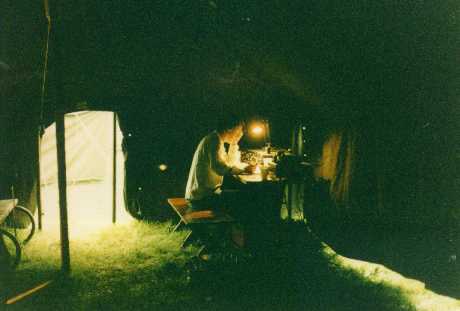 4 o'clock arrives; the contest is over. The site must be cleaned and restored to its original condition. Tents are taken down, carefully folded. Antennas and towers disassembled and returned to their coffins. The generator trailor is attached to the hitch on its caretaker's car. One by one the cars leave until the site is deserted. But the contest work is not done! That night, at kitchen tables all over the South Hills, logs are poured over, checked for duplicate entries, certified and readied for submission to the ARRL. The Brass Pounders did not win the contest, but the score is good, and the members can be proud of their standing. |